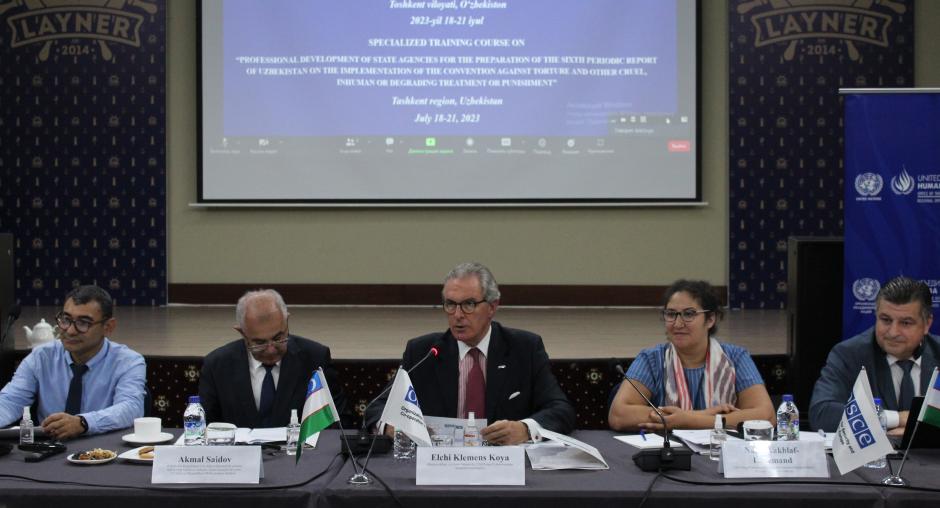OSCE organizes a specialized training for the preparation of the sixth periodic report of Uzbekistan on the implementation of the UN Convention against Torture

The universal and absolute prohibition of torture has been enshrined in several universal and regional treaties, and all fifty-seven OSCE participating States have ratified the United Nations Convention against Torture and Other Cruel, Inhuman or Degrading Treatment or Punishment (UNCAT). All States parties regularly submit reports to the UN Committee against Torture on measures being taken to implement the rights undertaken under the Convention, and receive recommendations from the Committee.
Against this backdrop, from 18 to 21 July 2023, the OSCE Project Co-ordinator in Uzbekistan (PCUz), in close collaboration with the National Center for Human Rights of the Republic of Uzbekistan and the Office of the UN High Commissioner for Human Rights – Regional Office for Central Asia (UN OHCHR ROCA) held a specialized training course titled “Professional Development of State Agencies for the Preparation of the Sixth Periodic Report Of Uzbekistan on the Implementation of the [United Nations] Convention Against Torture and Other Cruel, Inhuman or Degrading Treatment or Punishment” in the Tashkent region.
Thirty senior and mid-level government officials from the Senate and the Legislative Chamber of the Oliy Majlis (National Parliament), as well as ministries and agencies gained a deeper understanding of the international practices for the preparation of the periodic state report to the UN Committee against Torture, and examined the importance of ratifying the Optional Protocol to the UNCAT.
In his opening remarks, the Acting OSCE Project Co-ordinator, Ambassador Clemens Koja, underlined that “with the OSCE Ministerial Council Decision 7/20 adopted in 2020, the OSCE participating States have explicitly and unequivocally pledged to uphold the absolute prohibition of torture. In 2017-2023, we have witnessed the serious efforts undertaken by Uzbekistan to identify and eliminate shortcomings in torture prevention, affecting the level of protection of human rights and freedoms.”
Professor Akmal Saidov, First Deputy Speaker of the Legislative Chamber of the Oliy Majlis, Director of the National Center for Human Rights of the Republic of Uzbekistan noted that “a fundamental right that is recognized in both national laws and international human rights treaties is the prohibition of inhumane treatment and torture. No one may be subjected to torture, violence, or other cruel, inhuman, or degrading treatment or punishment, declares the new Constitution of the Republic of Uzbekistan."
Overall, participants deepened their knowledge of the UNCAT, the substantive state obligations and areas of interest for national reporting process, strengthening national capacity to improve the mechanism for monitoring and implementing the concluding observations of the UN Committee against Torture.
Mr. Jakhongir Azizkhodjaev, Acting Head of the UN OHCHR ROCA stressed that “amnesties for torture are incompatible with the obligations of State parties on absolute prohibition of torture; thus, they shall abstain from granting amnesties to perpetrators of torture and issuing pardons to persons found guilty of committing acts of torture.”
This specialized course was supported in the framework of the PCUz UB project “Promoting Rule of Law, Human Rights and Media Development”.
